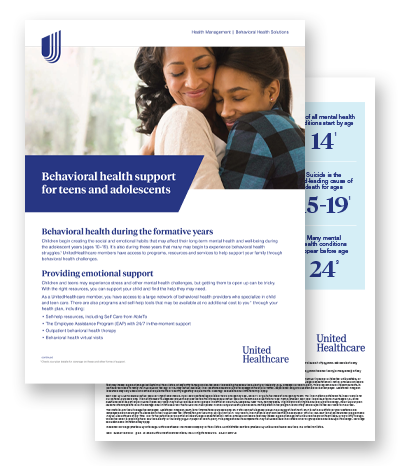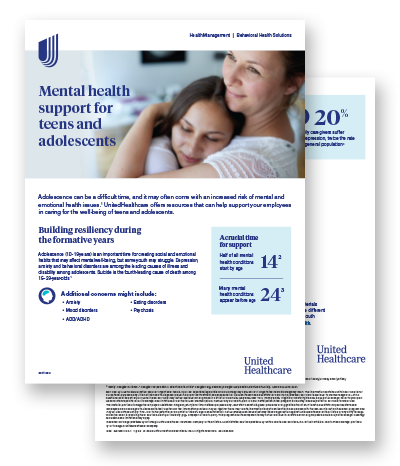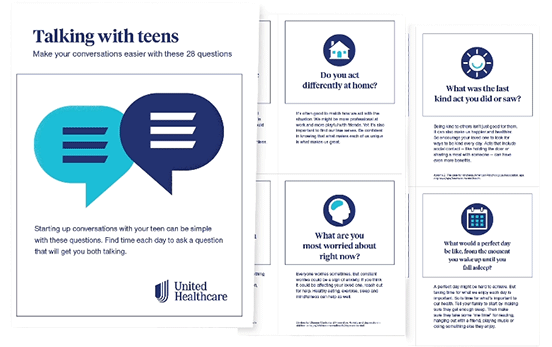Supporting employees who have children with mental health needs
Dr. Donald Tavakoli shares how employers can support their employees who have children with mental health needs by offering rich behavioral health benefits and a supportive workplace culture.

By Dr. Donald Tavakoli, National Medical Director of Behavioral Health at UnitedHealthcare
We can’t ignore the facts: Kids and teens are struggling with mental health issues more than ever before. Rates of depression, anxiety and suicide are rising among adolescents at such alarming rates that they warranted a Surgeon General’s Advisory in 20211 — and another in 2023 to address the impact of social media on youth mental health.2
Across the U.S., we’re seeing rising rates of anxiety, depression and teen suicide — and they’re disproportionately high in some states. In Vermont, for instance, 16.9% of children ages 3 to 17 years old have anxiety problems, compared to the national average of 9.2% of children.3 Kentucky experiences the country’s highest rates of youth depression, while Alaska has the country’s highest rates of teen suicide.3
As a father and a licensed and board-certified psychiatrist, I personally understand that parents often bring their concerns over their children with them to work. If they have a child who is struggling with anxiety or depression, that employee’s work may be affected.
In fact, more than half of surveyed parents reported missing work at least once a month to deal with their child’s mental health, while 30% to 50% said their thoughts surround their children’s mental health and well-being even when they’re at work.4
Youth mental health stats
- More than 1 in 5 children experience a mental health condition each year4
- 50% of mental illnesses begin by age 145
- 53% of working parents have missed work at least once a month to deal with their child’s mental health4
- 42% of parents and college students say they, or a college roommate/friend (or their college-age child, or their child’s roommate/friend), have sought help for mental or behavioral health concerns in the past year6
Employers need to recognize that employees bring their whole self to the office, which includes their identities as parents to children who are increasingly struggling with mental health issues. When working parents have supportive employers, there are better outcomes all around.
Equipping parents to help their kids
Employers can play a role in equipping parents to support their families’ mental health needs.
One way to support employees is offering medical benefits and encouraging employees to take their dependents to annual appointments, where mental health screenings are becoming more standard. That way, any mental health issues affecting dependents might be identified as soon as possible.
For instance, a primary care provider (PCP) may notice via a mental health screening that an employee’s child is at risk for certain mental health issues. When employers offer integrated medical and behavioral health benefits, it may make it easier for the PCP to more quickly connect that employee and child to the needed help and support. At UnitedHealthcare, employees can also access the help they need through a number of avenues, such as the Employee Assistance Program (EAP), a care advocate or through digital tools.
Employers can play a role in equipping parents to support their families’ mental health needs.
One way to support employees is offering medical benefits and encouraging employees to take their dependents to annual appointments, where mental health screenings are becoming more standard. That way, any mental health issues affecting dependents might be identified as soon as possible.
For instance, a primary care provider (PCP) may notice via a mental health screening that an employee’s child is at risk for certain mental health issues. When employers offer integrated medical and behavioral health benefits, it may make it easier for the PCP to more quickly connect that employee and child to the needed help and support. At UnitedHealthcare, employees can also access the help they need through a number of avenues, such as the Employee Assistance Program (EAP), a care advocate or through digital tools.
Employers can also help their employees’ families by offering plans with large networks of behavioral health providers and coaches, which extend beyond the immediate vicinity and around the country to provide support for college-age children. In a recent survey, Optum discovered that 42% of college students are enrolled as part of their family’s health plan.6 Those providers and coaches that offer virtual appointments may be especially helpful to working parents or to out-of-the-area college students.
In addition to offering behavioral health benefits, employers can also reduce the stigma that still exists around mental health issues by building a workplace culture that acknowledges mental health issues, regularly discusses them and reminds employees about the benefits that can help.
All-employee meetings, periodic email communications or health and well-being committees are all tactics employers can use to tout the importance of youth mental health, especially around back-to-school time periods, holidays or other transitions, which tend to be more challenging for youth than other times of year. At UnitedHealthcare, resources like the Employee Engagement Planner® (EEP) provide employers with readymade communications that can be helpful in reminding employees to stay engaged with their health and health plan.
During these discussions or communications, it’s also important that employers encourage employees to use their company’s flexible policies or leave benefits to care for their kids’ mental health issues. Employees should know that their jobs won’t be threatened if they must take time off to care for their families.
Encouraging the mental health conversation
Even as employers are talking more about mental health in the workplace, they can also encourage their employees to engage in conversations with their teens around mental health topics at home. For example, UnitedHealthcare launched a digital deck of conversation starters that may help.
It’s critical to note that working parents can only provide the mental health support and care their children need if their own mental health is cared for. Employers can play a large role in employees’ mental health — and put parents in a place where they’re able to better support their own families, from childhood to college and beyond.


